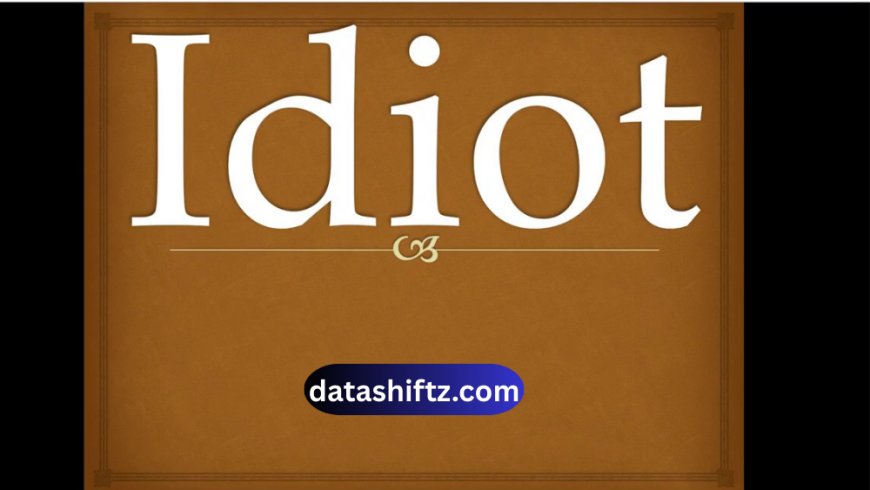Idiot: Understanding the Meaning, Usage, and Cultural Significance

Introduction
The word “idiot” has traveled a long way from its original meaning in ancient languages to its usage in modern society. While it is commonly used as an insult today, its history and application are far more complex than most people realize. From philosophy and psychology to literature and pop culture, “idiot” has had many layers of meaning. This blog will explore the origins of the word, its evolution, its portrayal in media, and how society interprets it in different contexts.
The Origin and Historical Background of “Idiot”
The word “idiot” finds its roots in the Greek term idiotes, which originally referred to a private individual or someone not engaged in public affairs. Unlike its derogatory meaning today, it initially described someone who chose not to participate in civic life. Over time, the word evolved into Latin (idiota) and Old French, eventually reaching English with a more negative connotation, meaning someone lacking in education or general knowledge.
In medieval Europe, the word was sometimes used in legal and medical contexts to describe people with intellectual disabilities. By the 18th and 19th centuries, it became a common insult in everyday speech, used to label someone perceived as foolish or ignorant.
“Idiot” in Literature and Philosophy
One of the most famous uses of the word appears in Fyodor Dostoevsky’s novel The Idiot (1869). The novel’s protagonist, Prince Myshkin, is considered an “idiot” by society because of his innocence, kindness, and lack of cunning. However, Dostoevsky uses the term ironically, showing that Myshkin’s so-called idiocy is actually moral purity in a corrupt world.
Philosophers and writers have also debated the use of the word “idiot” in describing people who step outside conventional norms. In some contexts, the “idiot” can even be seen as someone free from the complications of politics, greed, or deceit—an outsider who sees the world differently.
Psychological and Social Dimensions
In modern psychology, the term “idiot” is no longer a clinical classification, as it once was in the early 20th century when it referred to people with severe intellectual disabilities. Such usage is now considered outdated and offensive. Today, the word is mostly used in casual, colloquial settings as a synonym for foolishness, rashness, or lack of common sense.
Socially, calling someone an “idiot” often reflects frustration rather than a genuine assessment of their intelligence. For example, people might use it when someone makes a careless mistake, ignores obvious advice, or acts recklessly. The interpretation depends heavily on tone, intent, and context.
Evolution of the Word “Idiot”
| Era / Context | Meaning of “Idiot” |
|---|---|
| Ancient Greece | Idiotes – A private person uninvolved in public affairs |
| Medieval Europe | Someone uneducated or lacking formal training |
| Early Medical Terminology | A classification for severe intellectual disability (now obsolete) |
| Literature (Dostoevsky) | An innocent, pure-hearted person misunderstood by society |
| Modern Usage | An insult for foolish or reckless behavior |
| Cultural Representation | A comedic or ironic figure in films, books, and social conversations |
Idiot in Popular Culture
In popular culture, the word “idiot” has been widely used in film titles, songs, and comedy. For instance, the movie “3 Idiots” (2009), a Bollywood blockbuster, redefined the word by associating it with non-conformity and creativity. Instead of portraying idiots as foolish, the movie celebrated those who think differently and challenge outdated systems.
Similarly, comedians and satirists often use the word to highlight absurdity in politics or everyday life. The word carries a humorous tone when used in stand-up comedy or memes, making it more playful than insulting.
List of Ways the Word “Idiot” is Commonly Used Today
-
As a Casual Insult – To call out someone acting recklessly.
-
In Literature – Symbolizing innocence or an outsider’s perspective.
-
In Psychology (Historical) – Once a medical term, now obsolete.
-
In Cinema – Titles and characters that redefine foolishness (e.g., “3 Idiots”).
-
In Comedy – Used for humorous exaggeration of mistakes or silliness.
-
In Satire – Pointing out flaws in politics or society.
-
As Self-Deprecation – People jokingly call themselves “idiots” after mistakes.
-
In Internet Culture – Widely used in memes and online banter.
-
Philosophical Context – Describing someone detached from society’s norms.
-
Everyday Conversation – A common slang word for frustration or annoyance.
The Thin Line Between Humor and Offense
While “idiot” is often used casually, it can sometimes cause offense. In personal relationships, calling someone an idiot in jest may be harmless if both parties share mutual understanding. However, in formal settings, such language is seen as unprofessional and disrespectful.
The context matters: a teacher calling a student an “idiot” would be offensive, while two friends joking around might find it harmless. The balance between humor and insult is delicate and should always be handled with sensitivity.
Idiot as a Reflection of Society
The word “idiot” also reflects society’s values and tolerance for different behaviors. In some cases, what one person calls idiocy may actually be innovation or courage. For instance, great inventors, scientists, and artists were sometimes dismissed as “idiots” in their time, only to be celebrated later for their brilliance.
This shows that the label often says more about societal norms than about the individual being judged. Today, many thinkers argue that using the word “idiot” too loosely prevents us from appreciating unique perspectives.
Conclusion
The word “idiot” is far more layered than its everyday usage suggests. From its origins in ancient Greece to its role in literature, psychology, and popular culture, the term has carried both negative and ironic meanings. While it continues to be used casually as an insult, its cultural significance is undeniable.
Ultimately, the story of the word “idiot” teaches us about language itself: words change, adapt, and reflect the society that uses them. Whether used as humor, satire, or criticism, “idiot” reminds us that even the simplest words carry histories, philosophies, and deeper meanings.





























